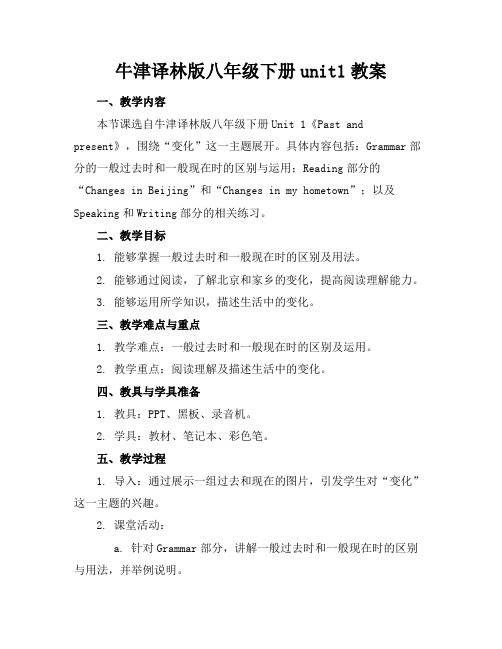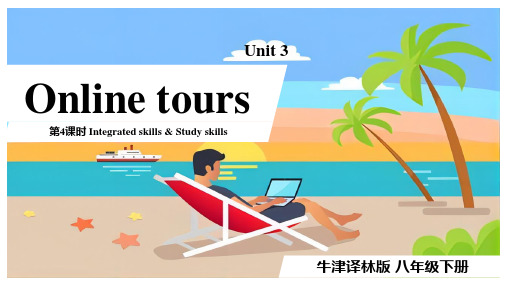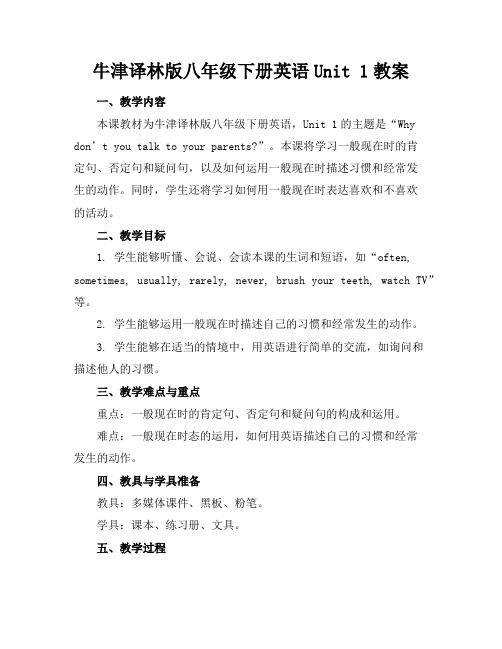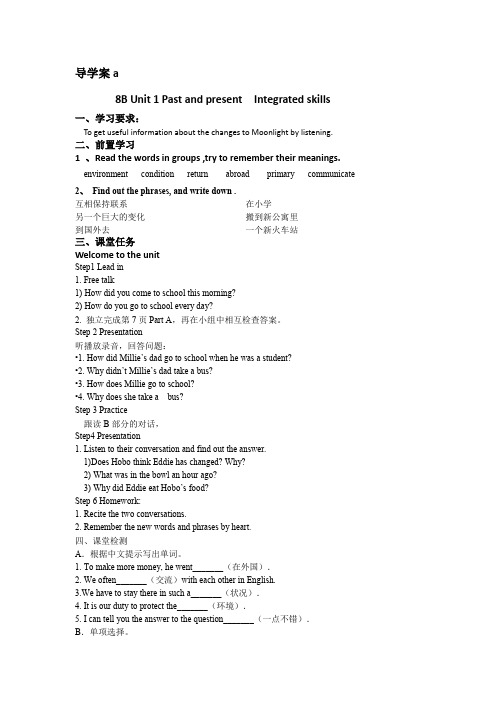1.9 Intermational 学案 (牛津译林八年级下册)
2023年牛津译林版八年级英语下册《unit 3 Integrated skills》教案

《unit 3 Integrated skills》教案年级Grade 8 科目English课题Unit3--Integrated skills 课时 1 课型教学目标1.了解更多旅游信息。
2. 能够从听力材料中获取有用的、准确的信息。
3.进一步了解如何利用网络获取有用信息。
重、难点教学设计详案二次备课内容We have known about a website called “Around the World in EightHours”. We can travel at home instead of going outside. It is anonline tour. Do you remember how to take an online tour?1.If you’re planning an onlin e trip, what city would you like to visit?1.Daniel and Peter are using the website “Around the World in EightHours”to plan an online trip to Australia. Turn to page 43 and readPartA1.Listen to their conversat ion and help Peter complete his notes.(7′(1). What can we use the website to do?(2). How do we use the website to learn about a city?(3).Can we see any pictures of the city?(4). Where can we find other information about the city?Thanks for your useful advice. Now let’s listen to Daniel and Peter’s second conversation and complete Part A2.Before listening, read thesentences and guess whether they are true or false.(7′K eys; F T F T F F1 Sydney is on the south-east of Australia.3.Sydney is near the sea.5 It takes about three hours to climb the Harbour Bridge.6.In April, it is autumn in Australia.Peter has learnt somethi ng about Sydney from the website. He’swriting about the online tour. Listen to the second conversation againand help Peter complete his article.(5′1.south-east 2 largest 3 sea 4 beaches5 Sydney Ope ra House6 theater7 ship8 Harbour Bridge 9 three hours10. autumn1 Listen and read ‘’Speak up’’, th en answer the questions;1) How do we start an online tour of a city?Just click on the ‘Tou r “icon and it’ll start .2) What should we do if we want to look at the pictures of the city ?Click on the “Camera “icon ,you can see many pictures of thecity .3) How do we print the pictures?Click on the “Print “icon .教师的职务是‘千教万教,教人求真’;学生的职务是‘千学万学,学做真人’。
牛津译林版八年级下册unit1教案(1)

牛津译林版八年级下册unit1教案一、教学内容本节课选自牛津译林版八年级下册Unit 1《Past and present》,围绕“变化”这一主题展开。
具体内容包括:Grammar部分的一般过去时和一般现在时的区别与运用;Reading部分的“Changes in Beijing”和“Changes in my hometown”;以及Speaking和Writing部分的相关练习。
二、教学目标1. 能够掌握一般过去时和一般现在时的区别及用法。
2. 能够通过阅读,了解北京和家乡的变化,提高阅读理解能力。
3. 能够运用所学知识,描述生活中的变化。
三、教学难点与重点1. 教学难点:一般过去时和一般现在时的区别及运用。
2. 教学重点:阅读理解及描述生活中的变化。
四、教具与学具准备1. 教具:PPT、黑板、录音机。
2. 学具:教材、笔记本、彩色笔。
五、教学过程1. 导入:通过展示一组过去和现在的图片,引发学生对“变化”这一主题的兴趣。
2. 课堂活动:a. 针对Grammar部分,讲解一般过去时和一般现在时的区别与用法,并举例说明。
b. 针对Reading部分,让学生阅读“Changes in Beijing”和“Changes in my hometown”,并完成相应的练习。
c. 针对Speaking部分,组织学生进行小组讨论,描述生活中的变化。
d. 针对Writing部分,让学生尝试用一般过去时和一般现在时描述生活中的一个变化。
3. 例题讲解:针对Grammar和Reading部分的重点内容,给出例题并详细讲解。
4. 随堂练习:让学生完成教材上的相关练习,巩固所学知识。
六、板书设计1. Unit 1 Past and present2. 内容:a. Grammar:一般过去时与一般现在时的区别与用法b. Reading:Changes in Beijing / Changes in my hometownc. Speaking:描述生活中的变化d. Writing:用一般过去时和一般现在时描述变化七、作业设计1. 完成教材上的练习题。
Unit 3 Integrated skills 八年级英语下册(牛津译林版)

F 3 Sydney is near a lake.
T 4 The Sydney Opera House looks like a ship with many sails.
[seɪl] n. 帆
F 5 It takes about 30 minutes to climb the Harbour Bridgemind doing sth.
答语: — (同意) Of course not./ No, not at all./ Not at all. — (拒绝) I’m sorry, but... / Please don’t... /Better not, please.
S e n t e n ces
Wo r d s
词形变换
book
English n.
England
queen
rule n.
ruler pound
Europe n.
European
dollar
vt. & vi. 预订,订(房间,车票等) n. (英国) 英格兰 n. 女王 n. 统治者;管理者 n. 英镑 adj. 欧洲的 n. 美元
If you click on it, you will see some photos of the city.
从句(状语)
if引导的条件状语从 句
主句 主时态用一般将来时
从句用一般现在时
主将从现
S e n t e n ces
点击空白处开启倒计时
玩法:倒计时,个人或小组代表复习句子。 目标:检验新学句子的识记情况。
Near the Sydney Opera House is the famous
2022年牛津译林版八年级英语下册《Unit 3 Integrated skills》学案

《Unit 3 Integrated skills》学案【学习目标】1.了解更多旅游信息。
2.能够从听力材料中获取有用的、准确的信息。
【重点、难点】教师个备或学生笔记1.进一步了解如何利用网络获取有用的信息。
2.学会用英语寻求帮助并对别人的请求作出回应。
【课前预习】词组翻译1.故宫_____________________2.港湾大桥____________________3.悉尼歌剧院________________4.介意(某人)做某事_____________5.在…的东北海岸_______________6.一艘有许多帆的轮船____________7.如何使用该网站________________8.为了了解这个城市________________9.带你去全世界的不同地方________________ 10.在菜单上________________11.靠近海____________/___________ 12.攀登港湾大桥________________13.与...相反________________ 14. 进行网上旅游________________【学习过程】Step 1 Revision (Translation)1. 几天前我在街上遇见了一位老朋友。
2. 我已经很久没有看电影了。
Step 2 Free talkStep 3 Travelling at home1. Daniel and Peter a re planning an online tour of Sydney, Australia. Listen to A12. Peter took some notes of Sydney. Listen to Daniel and Peter's second A23. Peter is writing about the online tour. Listen to their second conversationagain and help him complete his article. A3Step 4 Speak up1.Sandy is asking for Millie's help with the online tour. Listen and answere.g How can we start the online tour?If I want to see some pictures of the city, how should I do?Can we print the pictures out?2.Read follow the recording.Step 5 Language pointsStep 6 ExercisesStep 7 Homework【当堂训练】完成单词1.Nobody_______(介意)your smoking here.2.Sydney is c_____________ to the s__________. It is a s__________ city.3.Do you know when I can_______(打印)the paper?4.The post office is the o_______of the shopping mall.5.It's my_______(乐意)to help you with your English.6.—Can I help you? Here is the m_________. –Thanks. I’d like some beef......7.Sanya is on the south c______________ of China.8.When it is summer in China, it is _______ in Australia. 9.If yo want to look at some photos of the city, c_______ on the “C________” icon.10.The old man often d_______about being wealthy.【课后提升】一、用所给单词的适当形式填空1. Sydney is_______ (large) city in Australia.2. Would you mind my_______ (speak) English with you?3. It takes about 30 minutes_______ (finish) my maths exercises.4. The film is_______ (real) interesting.5. I want to start by_______ (sing)a song.6. I am not hungry. I ________________ (just hav e) my dinner.7. --Where is George? --He_______________ (go) shopping_______(buy) a camera.8. Mr. Wang __________(be )in Beijing for thirty years. He __________ (be ) here in 1950.9. She ___________ (begin)_writing this novel four years ago and is still writing it.10. Yesterday we _______________(drive)up to London to see our friend from China.11.Do you know how long your grandparents ________________(die)?12.All the students in class 1 except Linda _____( go ) to plant trees, the classroom is quiet.13._______(improve) his spoken English, he did what he could ________(practise) more.14.The class trip we are looking forward to __________(come) soon.15.He spends his money carefully because he _______(save) money _____(buy) a new car.二、单项选择。
牛津译林版八年级下册英语Unit1教案

牛津译林版八年级下册英语Unit 1教案一、教学内容本课教材为牛津译林版八年级下册英语,Unit 1的主题是“Why don’t you talk to your parents?”。
本课将学习一般现在时的肯定句、否定句和疑问句,以及如何运用一般现在时描述习惯和经常发生的动作。
同时,学生还将学习如何用一般现在时表达喜欢和不喜欢的活动。
二、教学目标1. 学生能够听懂、会说、会读本课的生词和短语,如“often, sometimes, usually, rarely, never, brush your teeth, watch TV”等。
2. 学生能够运用一般现在时描述自己的习惯和经常发生的动作。
3. 学生能够在适当的情境中,用英语进行简单的交流,如询问和描述他人的习惯。
三、教学难点与重点重点:一般现在时的肯定句、否定句和疑问句的构成和运用。
难点:一般现在时态的运用,如何用英语描述自己的习惯和经常发生的动作。
四、教具与学具准备教具:多媒体课件、黑板、粉笔。
学具:课本、练习册、文具。
五、教学过程1. 情景引入:教师通过展示一幅图片,图片中有一个男孩在刷牙,一个女孩在看电视,引发学生对日常习惯的讨论。
2. 新课导入:教师引导学生学习一般现在时的肯定句、否定句和疑问句,并通过例句和练习让学生掌握一般现在时的构成和运用。
3. 课堂实践:教师设计一些情境,让学生运用一般现在时进行角色扮演和小组讨论,如描述自己的日常习惯,询问和描述他人的习惯等。
4. 随堂练习:教师给出一些练习题,让学生独立完成,检验学生对一般现在时的掌握程度。
六、板书设计板书内容:一般现在时肯定句:主语 + 动词原形否定句:主语 + don't/doesn't/does not + 动词原形疑问句:Do/Does/Doesn't + 主语 + 动词原形?七、作业设计1. 作业题目:用一般现在时描述你的日常习惯,并写一篇短文介绍你的朋友。
牛津译林版八年级下册导学案:U1 Integrated skills

导学案a8B Unit 1 Past and present Integrated skills一、学习要求:To get useful information about the changes to Moonlight by listening.二、前置学习1 、Read the words in groups ,try to remember their meanings. environment condition return abroad primary communicate 2、Find out the phrases, and write down .互相保持联系在小学另一个巨大的变化搬到新公寓里到国外去一个新火车站三、课堂任务Welcome to the unitStep1 Lead in1. Free talk1) How did you come to school this morning?2) How do you go to school every day?2. 独立完成第7页Part A,再在小组中相互检查答案。
Step 2 Presentation听播放录音,回答问题:•1. How did Millie’s dad go to school when he was a student?•2. Why didn’t Millie’s dad take a bus?•3. How do es Millie go to school?•4. Why does she take a bus?Step 3 Practice跟读B部分的对话,Step4 Presentation1. Listen to their conversation and find out the answer.1)Does Hobo think Eddie has changed? Why?2) What was in the bowl an hour ago?3) Why did Eddie eat Hobo’s food?Step 6 Homework:1. Recite the two conversations.2. Remember the new words and phrases by heart.四、课堂检测A.根据中文提示写出单词。
2020-2021学年牛津译林版英语八年级下册Unit2Integratedskills教案
(1)语法:一般将来时态和现在进行时态的区分与运用。
-难点举例:学生在实际对话中容易混淆两种时态,需要教师通过具体情境和例句进行解释和指导。
(2)词汇:旅行相关词汇的拼写和用法。
-难点举例:部分词汇拼写相似,如destination和departure,学生容易混淆。教师需通过对比、联想等方法帮助学生记忆。
3. section C:写作练习,制定个人旅行计划。
-写作指导:如何撰写旅行计划,包括目的地、行程安排等。
-练习:学生根据所学内容,制定自己的旅行计划。
二、核心素养目标
本节课的核心素养目标为:
1.语言能力:培养学生运用英语进行旅行话题的听说读写综合运用能力,掌握一般将来时态和现在进行时态,提升语言表达能力。
2.在实践活动和小组讨论中,部分学生表现较为被动,可能是因为他们对旅行计划的相关知识还不够熟悉。为了提高这部分学生的参与度,我可以在课堂上多设置一些简单易懂的任务,让他们在完成过程中逐渐增强自信。
3.在教学过程中,我注意到部分学生对于阅读材料中的旅游景点和特色了解不足。为了拓展他们的国际视野,我可以在课后布置一些关于世界各地旅游景点的阅读材料,让学生们了解更多相关信息。
1.讨论主题:学生将围绕“旅行计划在实际生活中的应用”这一主题展开讨论。他们将被鼓励提出自己的观点和想法,并与其他小组成员进行交流。
2.引导与启发:在讨论过程中,我将作为一个引导者,帮助学生发现问题、分析问题并解决问题。我会提出一些开放性的问题来启发他们的思考。
3.成果分享:每个小组将选择一名代表来分享他们的讨论成果。这些成果将被记录在黑板上或投影仪上,以便全班都能看到。
-学生需要掌握并正确运用词汇,如destination(目的地)、schedule(行程)、flight(航班)等。
2021年牛津译林版八年级英语下册Unit 1 (3)学案.doc
Unit 1 (3)学案单词:in some ways; however; impossible; before; lonely; from time to time; anyway; husband; interview;all on e’s life句子:1. 从我出生起我就住在这里。
I have lived here since I was born.2. 你曾搬过家吗?Have you ever moved house?3. 这些年里镇上变化大吗?Has the town changed a lot over the years?4. 过去曾有一个钢铁厂。
There was once a steel factory.= There use d to be a steel factory.5. 对我们来说,像以前一样经常见面已经变得不可能了。
It has become impossible for us to see each other as often as before.6. 阳光镇已经发生了惊人的变化。
Amazing chang es have taken place in Sunshine Town.=There have been amazing changes in Sunshine Town.7. 告诉我更多关于你对…的采访tell me more about your interview with sb.8. 过去这个镇怎么样?What was the town like in the past?= How was the town in the past?Consolidation一、完成句子。
Uint1 Past and present Integrated skills教案 牛津译林版八年级下册
T: What kinds of wildlife live there?
Ss: Wild ducks and birds etc.
T: What can you see in the picture on the right?
8B Uint1 Past and present
课题
课时
第6课时
课型
New
教学目标
1.听对话、获取信息,完成表格。
2.根据表格内容完成短文填空。
3.能谈论自己生活的变化。
重点难点
培养学生从所给的听力或书面材料中获取、选择和重新组合信息的能力,在此基础上培养学生的口头、笔头表达能力。
教学过程
复备
Part One: Lead-in
Task 3
Present part A2
T: Have you ever been toStarlightTown?
Do you know it well?
Ss: ….
T: Simon is writing aboutStarlightTownin his diary. Heቤተ መጻሕፍቲ ባይዱp him complete his diary entry on page 19.
Say something aboutSunshineTownin the past and now.
Part Two: Pre-task
Talk about the pictures below.
Teacher asks:
T: What can you see in the picture on the left?
牛津译林版英语八年级下册Unit4Integratedskills教学设计
5.家庭作业:
a.家长协助孩子记录一次家庭公益活动,让孩子用英语描述活动过程,家长可进行适当的指导。
b.家长鼓励孩子参加社区或学校的公益活动,培养孩子的社会责任感。
作业布置的目的是让学生在课后能够自主复习和巩固所学知识,同时将英语学习与实际生活相结合,提高学生的实际运用能力。希望同学们能够认真完成作业,不断提升自己的英语素养。
2.培养学生关爱他人、乐于助人的品质,提高道德素养。
3.引导学生认识到团队合作的重要性,学会与人沟通、协作。
4.激发学生对英语学习的兴趣,培养积极的学习态度,提高自信心。
5.培养学生的跨文化意识,了解不同国家和地区的文化差异,尊重和理解他人。
二、学情分析
针对牛津译林版英语八年级下册Unit 4 Integrated skills的教学内容,我对学生情况进行以下分析:
2.教学目的:培养学生团队协作能力,提高他们的口语表达能力。
3.教学步骤:
a.学生分组,每组选一个小组长,负责组织讨论。
b.学生分享自己参加过的公益活动,讨论在活动中的所见所闻。
c.各小组汇报讨论成果,其他小组倾听、提问、交流。
(四)课堂练习
1.教学活动:教师设计一系列课堂练习,包括填空、选择、改错等,让学生巩固所学知识。
3.教学步骤:
a.学生观看视频,进行思考。
b.教师提问,学生回答,共同讨论视频中的内容。
c.教师引导学生关注视频中的重点词汇和句型,为新课的学习做好铺垫。
(二)讲授新知
1.教学活动:教师通过PPT展示、讲解和实例分析,向学生传授一般过去时的用法以及与公益活动相关的词汇和句型。
- 1、下载文档前请自行甄别文档内容的完整性,平台不提供额外的编辑、内容补充、找答案等附加服务。
- 2、"仅部分预览"的文档,不可在线预览部分如存在完整性等问题,可反馈申请退款(可完整预览的文档不适用该条件!)。
- 3、如文档侵犯您的权益,请联系客服反馈,我们会尽快为您处理(人工客服工作时间:9:00-18:30)。
【自学探究】 一、 预习pp83-85,在课本上划出下列词组和句子并翻译。 (过去)经常做某事 谈论„„ 在医院里 失明 吃早饭 给„„做手术 花时间做某事 在奥比斯飞机上 给„„治疗眼疾 如以往的收入 更有意义 习惯于„„ 炎热的天气 离家老远 工作时间 不寻常的生活方式 起初 觉得很晕 一名飞行着的医生 想当„„ 一名志愿者医生 长大 如此„„以至于„„ 供得起„„ 医疗眼疾 感激某人 足够的细心 对某人有必要„„ 保持学习 感觉很累 二、 完成课本pp83-85, parts A & B 练习。 三、 used to 与 be used to 的区别。 四、 so 与 such 的区别。 【教案】 课题 8B Unit 5 Grammar 课型 新授课
教学目标 1. 学习运用used to来谈论过去经常性的动作或过去的状态。 2. 学习运用be used to来谈论过去的惯例。 3. 学习区分运用so … that…和such … that . 重难点分析 used to和be used to 结构相似意义相近,难以掌握,需作重点操练。
学情分析 学生学过use作为“使用”的用法,容易错误地推测used to 和be used to的意义。so 和such意义相同,但词性不同,而学生对于它们的使用场合极易混淆,故需进行比较归纳。 教学方法 情景教学法、归纳法 教具准备 课件
教学步骤 教师活动 学生活动 个性化补充
STEP 1 Warming up Choose and write some of Answer Say:Let‟s have a free talk. (Ask A) Do you often swim in summer? Did you often swim last summer? Where did you like to swim? How did you like swimming? How often did you swim? (Ask B) Do you often play basketball? Did you often play basketball? When did you like to play basketball? How do you like basketball stars ? Can you tell us some of them? (Ask C) Do you live in a city? Did you like to live in the country? How is the city like? (Ask D) Do your family like a computer? Do you often use a computer? Did you like to use a computer? Did you often use a computer
the answers on the blackboard. I often swam in the river. I often swam in the river last summer. I liked swimming very much. I swam every afternoon. He often played basketball after school. He liked to play basketball after school. He likes basketball stars. He can tell everyone‟s names. She liked to live in the country. The city is very beautiful. She likes the city very much. They didn‟t often use a computer. The computers are wonderful. They all like it. They want to buy some more. Change the first sentence into: I used to swim in the river. Ask some students to change the others by themselves. the questions.
Learn to change the sentences.
Read and think. in the past? What do you think of the computer? STEP 2 Presentation. 1. Explain that we use „used to‟ to talk about a past habit or state that does not happen any more.
2.Ask students to look at the examples at the top of p83. Ask them to think of other examples. 3.Change the two sentences into positive and negative sentences, then tell the students how to form Tag Questions. (Pay attention to their changes.) STEP 3 Practice (Finish the exercises on p83.) 1. Help describe what Dr Ma‟s work was like using „used to‟ then check in pairs. 2.Go through the answers with the class orally. STEP 4 Consolidation . 1.Make sentences with „used to‟ . 2.Work in pairs.( Ask students to bring a photo of themselves when they were younger. Students tell each other what their lives were
He used to play basketball after school. Write the structure “subject + „ used to‟ + infinitive” on the blackboard. Ask the students to try and then give the correct answers to them. Help the students. Change the first sentence into: I am used to swimming in the river. Ask some students to change the others by themselves. Try to give the answers to them.
Give the answers to them.
Work in pairs.
Learn to change the sentences.
Try to give the answers to them. like in the past. Each student should make up at least three sentences with „used to‟. Ask some to tell the class about their partners‟ lives using „used to‟.) STEP 5 Presentation. 1. Explain we often use „be used to‟ to talk about something we have done regularly for a long time so that it is not new any more. We put it before a noun (phrase) or „-ing‟ form of a verb.) 2.Stress that the meaning of „be (get) used to‟ (习惯于) is different from „used to‟(过去常常). 3.Ask students how their lives have changed since they started secondary school. 4.Work in pairs. (Ask students to formulate sentences to express the idea of becoming accustomed to something.) 5.Go through the explanation and example sentences on p 84. Explain how to form positive and negative sentences with „be (get) used to‟.
STEP 6 Presentation. 1. Explain we often use „so…that‟ to describe the action or degrees.
He is used to playing basketball after school. She was used to living in the country. They weren‟t used to using the computer. Write the structure “subject + „be/get used to‟ +-ing” on the blackboard. Ask the students to try and then give the correct answers to them. Ask students to pay attention when „be used to‟ means „ 被用于 ‟, we should use an infinitive after it. Change the first sentence into: I liked swimming so much that I swam in the river every afternoon.. Ask some students to change the others by themselves. He likes so many basketball stars that he can tell everyone‟s names of theirs. The city is so beautiful that she likes it very much.. They have such a wonderful computer that they want to buy some more. Work in pairs.
